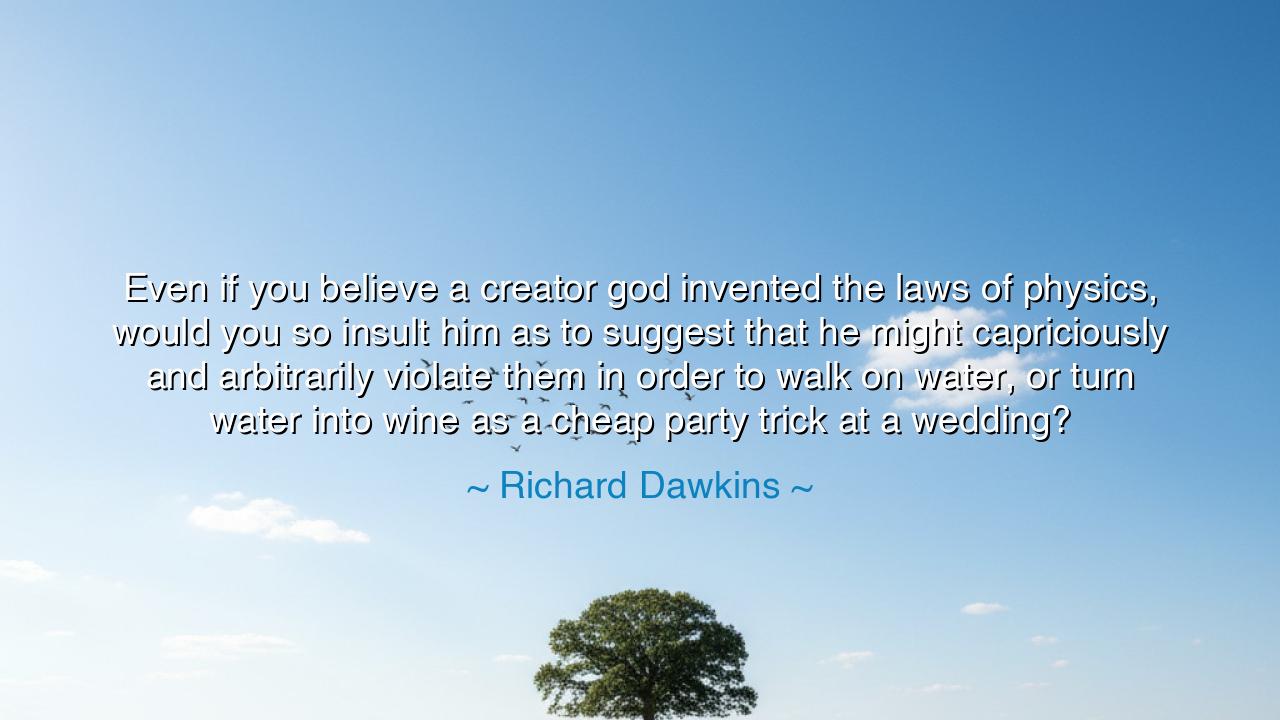
Even if you believe a creator god invented the laws of physics
Even if you believe a creator god invented the laws of physics, would you so insult him as to suggest that he might capriciously and arbitrarily violate them in order to walk on water, or turn water into wine as a cheap party trick at a wedding?






The words of Richard Dawkins—“Even if you believe a creator god invented the laws of physics, would you so insult him as to suggest that he might capriciously and arbitrarily violate them in order to walk on water, or turn water into wine as a cheap party trick at a wedding?”—are forged in the fire of reason and challenge. They remind us that the majesty of natural law itself is miracle enough, and that to imagine a divine creator breaking these laws frivolously diminishes, rather than exalts, the grandeur of creation. To Dawkins, reverence lies not in stories of spectacle, but in the deep harmony of the cosmos.
This utterance is a call to honor the consistency of the universe. The laws of gravity, motion, and energy—whether born of chance or of divine will—are the sacred architecture of existence. To suggest they could be bent at whim, as though to entertain a feast or astonish a crowd, is to see the divine not as majestic, but as capricious. Thus, Dawkins challenges us: if you would believe in a creator, believe also in the strength of his design, which needs no violation to inspire awe.
History offers a parallel in the work of Isaac Newton, who sought to read the “mind of God” through the laws of motion and gravitation. Newton did not revere miracles of spectacle, but the miracle that apples fall and planets circle in harmony. His discoveries revealed that the order of the heavens was not random, but woven with logic and beauty. Just as Newton honored the universe by uncovering its laws, Dawkins insists that true reverence lies in respecting their constancy.
The quote also serves as a rebuke of human projection. For when people imagine gods altering the fabric of reality for weddings or wonders, they risk shrinking the divine into human desires. To claim that the infinite bends itself for spectacle is to mistake majesty for entertainment. Dawkins’ words pierce this illusion, urging us to look deeper, beyond myth, into the grandeur that requires no embellishment.
Let this be a teaching for generations: whether you believe in the divine or in the blind workings of nature, honor the laws of physics as sacred and unbroken. Do not cheapen the vastness of creation by imagining it overturned for trivial ends. For the true miracle is not in water becoming wine, but in water itself—molecules bound, flowing, nourishing, shaping life. To see this truth is to stand in awe not of miracles, but of reality itself, which shines brighter than any party trick.






MNTra My Nguyen
This is such a sharp critique of religious narratives. I appreciate the logic — if a creator god designed perfect natural laws, then breaking them would seem inconsistent. Yet, for many people, miracles are less about physics and more about faith, hope, or mystery. It makes me ask: should religion always conform to scientific reasoning, or is its purpose something entirely different — to address what science can’t?
NNNgan Nguyen
I find this quote both fascinating and uncomfortable. It forces believers to confront the tension between reverence for divine creation and belief in supernatural exceptions to natural law. But maybe miracles aren’t meant to be literal violations of physics, but symbolic acts carrying moral or spiritual meaning. I’d love to hear how theologians respond to this kind of challenge — is faith purely rational, or beyond reason?
NANguyen A
Dawkins always has a way of framing things to make you rethink assumptions. His tone feels sarcastic, maybe even mocking, but the core question is valid — would an all-knowing creator break their own rules just to prove a point? It raises a bigger philosophical issue about the nature of miracles: are they signs of divine power, or of human misunderstanding of the natural world?
CMTrinh Chu Minh
This statement definitely challenges traditional religious beliefs in a provocative way. I can see why it stirs debate — it questions not just faith, but the logic behind miracles themselves. It makes me wonder: if we accept that the universe runs by consistent laws, does belief in divine intervention contradict that? Or can faith and science coexist without one undermining the other?